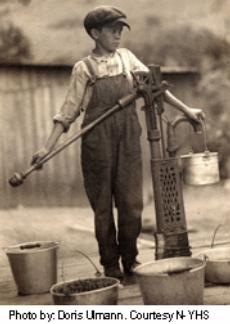From The Classroom To The World
dal 8/4/2004 al 18/7/2004
Segnalato da
8/4/2004
From The Classroom To The World
New York Historical Society, New York
Hine, Ulmann, Strand, Arbus And The Ethical Culture Fieldston School. The first exhibition to examine the crucial, formative role of the Ethical Culture Fieldston School in the work of some of the United States' most important photographers, whose work helped define the course of modernist American photography by identifying humanistic perspectives of individual and social welfare. The exhibition, consisting of approximately eighty images, explores the achievements of four photographers

Hine, Ulmann, Strand, Arbus And The Ethical Culture Fieldston School.
In 2004 the Ethical Culture Fieldston School celebrates 125 years as one of the nation's leading education institutions. Established in 1878 by Felix Adler, the school and the progressive education movement it embodied were dedicated to the transformation of society through moral education based on humanist values, with adherence to no sectarian creed. From the Classroom to the World represents the first exhibition to examine the crucial, formative role of the Ethical Culture Fieldston School in the work of some of the United States' most important photographers, whose work helped define the course of modernist American photography by identifying humanistic perspectives of individual and social welfare. The exhibition's theme of children and families, a recurring visual motif found in each of the photographers' groundbreaking work, helps to illuminate the progressive ideals of the school's teachings.
The exhibition, consisting of approximately eighty images, explores the achievements of four photographers who were shaped by their involvement with the Ethical Culture Fieldston School: Lewis Hine, Doris Ulmann, Paul Strand, and Diane Arbus. For all four, the school's enduring humanist philosophy was a touchstone throughout their careers, leading to significant bodies of work, spanning American modernism from 1900 to 1970, and showing the social, documentarian, and psychological value of the camera-made image in culture and art.
Circa 1904, under the leadership of school principal Frank Manny and nature study and geography instructor Lewis Hine, the Ethical Culture Fieldston School became one of the nation's first educational institutions to originate a full-scale photography program. For Hine, the power of the camera lay in its documentarian nature, producing evidentiary documents that could be constructive and popular foils for social reform. During his tenure at the School, he began work on numerous groundbreaking series including immigrants at Ellis Island and child labor focusing on the plight of children and their families who worked in textile mills, factories and mines.
As a teacher-trainee and student, respectively, Doris Ulmann and Paul Strand were greatly influenced by the values of Felix Adler, and Paul Strand was inspired by his experience in Lewis Hine's after-school photography club. Though their individual, expressive photographic styles differed, both Strand and Ulmann shared Hine's belief in the factual accuracy of the camera and sought to uphold social idealism. Doris Ulmann saw her work among communities in Appalachia and the South Carolina coast to be of strong social value. While Ulmann did not share with Strand a predilection for the abstract purity of photographic form, choosing instead to create atmospheric, soft-focused compositions, she did seek to portray the individual character and spirit of her sitters, many of whom were children and their families. Hers was a unique social vision, informed by the progressive spirit of her age which celebrated the dignity, rather than the poverty, of a rural society. As Hine's most notable and influential student, Strand became one of the leading lights of a humanistic perspective in the visual arts during the so-called Progressive Era in the first decades of the twentieth century. His images of the human figure in the changing American environment, including figures of children and families, reveal his deep moral attitude and compassionate regard for his human subjects.
Diane Arbus attended the Ethical Culture Fieldston School from 1928 until her graduation in 1940. Although her career would be short and intense (she died at the age of forty-eight), Arbus's photography has taken on legendary proportions. Her images of people, including children, are critically regarded as masterfully composed psychological metaphors of a fitful American society dislocated from its moral and spiritual center. A documentarian of the interior life, Arbus took on as her subjects the complexities of modern society, especially the absurdities of the American middle class.
As From the Classroom to the World demonstrates, photography and its social role have long been among the most intriguing and important legacies of the Ethical Culture Fieldston School. The photography of Lewis Hine, Paul Strand, Doris Ulmann, and Diane Arbus attests to its influential status in American art with humanistic principles that combined social responsibility with personal creativity. Through images of children and families, this exhibition illustrates the essential contributions of the School, an enduring legacy that has shaped, and was shaped by, the progressive beliefs and ideals of a developing national spirit in art and culture. Today, the Ethical Culture Fieldston School serve 1,600 students from pre-K to 12, on two campuses, one in Manhattan and one in Riverdale; the visual arts continues to be an essential part of the curriculum, and in the middle and high school alone, over 100 students can be found studying photography.
From the Classroom to the World: Hine, Ulmann, Strand, Arbus and the Ethical Culture Fieldston School is made possible with the generous support of The Liman Foundation. Programs at The New-York Historical Society are made possible in part with public funds from the New York City Department of Cultural Affairs and the New York State Council on the Arts, a State Agency. American Airlines is the official airline of The New-York Historical Society. WNYC Radio is The New-York Historical Society's valued media sponsor for the 2003-2004 season.
The New-York Historical Society
2 West 77th Street at Central Park West
Museum Hours (All Year):
Tuesday - Sunday: 10 a.m. - 6 p.m. Monday: Closed



